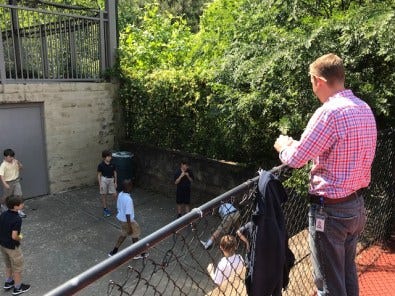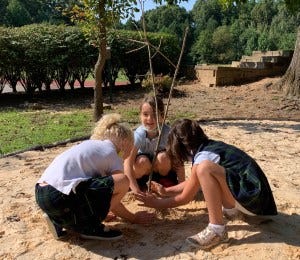Stop! Pay Attention! You're on Recess Duty.
Unstructured Recess Does NOT Equal Unsupervised Recess
Unstructured Recess Does NOT Equal Unsupervised Recess
In some instances educators confuse unstructured recess with unsupervised recess. While students are being challenged by the real life lessons recess naturally provides, educators must be present. Recess is NOT time for a break, to grade papers, to sit and chat with colleagues, or to catch up on social media.
Too often, adults on recess duty forget their purpose or simply don’t understand how vital their role is during a child’s free and unstructured play time.
What is the teacher’s role while on recess duty? Top 10 tips to guide you
.
1. SPREAD OUT – Supervisor zones
Teachers need to spread out and observe. Much like lifeguards at a busy beach or water park, adults on recess duty need to separate themselves from other adults and keep their heads on a swivel. We need to resist the temptation to sit or stand in a group socializing throughout recess.
2. BE CONSISTENT WITH RECESS EXPECTATIONS
Every school should have a clear set of recess expectations and boundaries. Teachers on recess duty must not only know them but also consistently enforce them. It can be frustrating for teachers and students when some teachers adhere to the recess rules while another group of teachers has loose interpretations, barely enforcing them. As teachers, we need to be consistent and fair.
3. GIVE STUDENTS A CHANCE TO RESOLVE CONFLICT ON THEIR OWN
There’s no doubt conflict runs rampant during recess. Whether it’s a heated football game or a group of students excluding someone from their tribe, conflict is inevitable. It’s also necessary. It helps foster resilience and assists in developing problem-solving strategies. It’s important for recess duty teachers to allow students the opportunity to resolve conflict on their own.
On some occasions, a teacher may need to step in to facilitate and give students the tools necessary to resolve present and future issues.
4. KNOW THE “HOT SPOTS”
While on recess duty, there are always areas on the playground that need more of a watchful eye than others. For example, if the majority of a class is playing in the Gaga pit, then obviously this area needs direct supervision. One, because of the volume of students, and two, Gaga ball tends to be a game that challenges student integrity (stay tuned for a future post called, Gaga! Welcome to the Integrity Ball!).
5. BE PRESENT, ALERT, AND RESPONSIVE
Scan the playground from your post. Even if you’re on fifth-grade recess duty, be prepared to assist students from other grade levels on different parts of the playground as needed. Just because students aren’t under your direct supervision, doesn’t mean you’re not responsible for their well-being.
6. PROVIDE TOOLS FOR STUDENT SUCCESS
Hypothetically speaking, let’s imagine a group having difficulty playing football on a daily basis. They can’t agree on teams, and the games are out of control.
Teachers can become frustrated with the students and ultimately ban them from playing. A better idea would be to monitor the games daily and give the students ample opportunity to resolve conflict.
When and if necessary, provide them with the tools to make teams and strategies to resolve conflict during the games. It may not be easy, but it’s a teachable conflict that will take time and patience.
7. OBSERVE CHILDREN OUTSIDE THE CLASSROOM
Take advantage of your recess duty to learn something new about each of your students. You may already know a certain student loves to read, but struggles in math. However, did you realize the same child enjoys running and catching insects? Use this knowledge to build connections with your students.
8. FIRST TO ARRIVE LAST TO LEAVE
Punctuality is a must. Never give the students an opportunity to be unsupervised. Whether picking up your students from a classroom or meeting them on the playground, students deserve the entire allotted time to run, play, and explore on the playground. When recess is over, make sure all your students have safely lined up and made their way back into the school.
9. REDIRECT CHILDREN TO APPROPRIATE ACTIVITIES
Kids are inquisitive. Many, if not all, have an innate desire to explore, even if it pushes beyond the recess expectations and boundaries. In many instances, children are so engaged and hyper-focused on what they’re doing, they don’t realize they may be doing something wrong. You might find a group of students organizing a soccer game in the middle of a preexisting football game. After giving the two groups ample opportunity to resolve the overlap, you may have to help the soccer players find another safe place to play.
It can be easy to assume bad intentions when you notice a child or children breaking rules or overstepping boundaries. Take a deep breath, and calmly approach the situation. Have a conversation to discover the true intentions. If necessary, redirect them to appropriate activities. Often, the original idea can be tweaked in order to make it acceptable for recess.
10. EMERGENCY READINESS
Student and teacher safety is of utmost importance during recess. All teachers need to be ready to react to any given situation.
Here are my top 7 Emergency Readiness Strategies:
Know the protocol for minor and serious injuries.
Memorize your nurse’s phone number and/or program it into your phone.
Keep your CPR and First Aid certifications up to date.
Be able to locate or direct another person to your school’s Automated External Defibrillator (AED).
Study your school’s emergency guidelines in regard to severe weather and intruders.
Be sure your colleagues are on duty with you, an appropriate student-to-teacher ratio is a must.
When an emergency situation presents itself, be proactive.
For teachers, recess duty is a job in itself. I’ve been extremely fortunate to currently work in a school where recess is taken seriously. All students in all grade levels receive recess daily. Our administrators begin each school year with a reminder that all recess duty teachers must spread out and supervise the outdoor classroom.
So next time you’re on recess duty, remember “duty” isn’t just a word that makes your kids laugh (like mine). It is a critical responsibility to ensure children are safe and given an opportunity to blossom in their outdoor playground. Make sure you’re qualified, follow my 10 tips, and keep those kids in motion!
This post is dedicated to Maryellen Berry. An amazing teacher, administrator, friend, and yes, recess monitor. Maryellen, thank you for consistently reminding us that education happens everywhere, even/especially on the playground.
“Recess Makes Kids Smarter | Scholastic.” Scholastic Publishes Literacy Resources and Children’s Books for Kids of All Ages, http://www.scholastic.com/teachers/articles/teaching-content/recess-makes-kids-smarter/.
If you enjoyed this post, consider following my blog to receive future posts.
Follow me on Twitter: http://www.twitter.com/justybubpe.
Check out my Facebook group called Keeping Kids in Motion!








Excellent article. The RecessDoctor